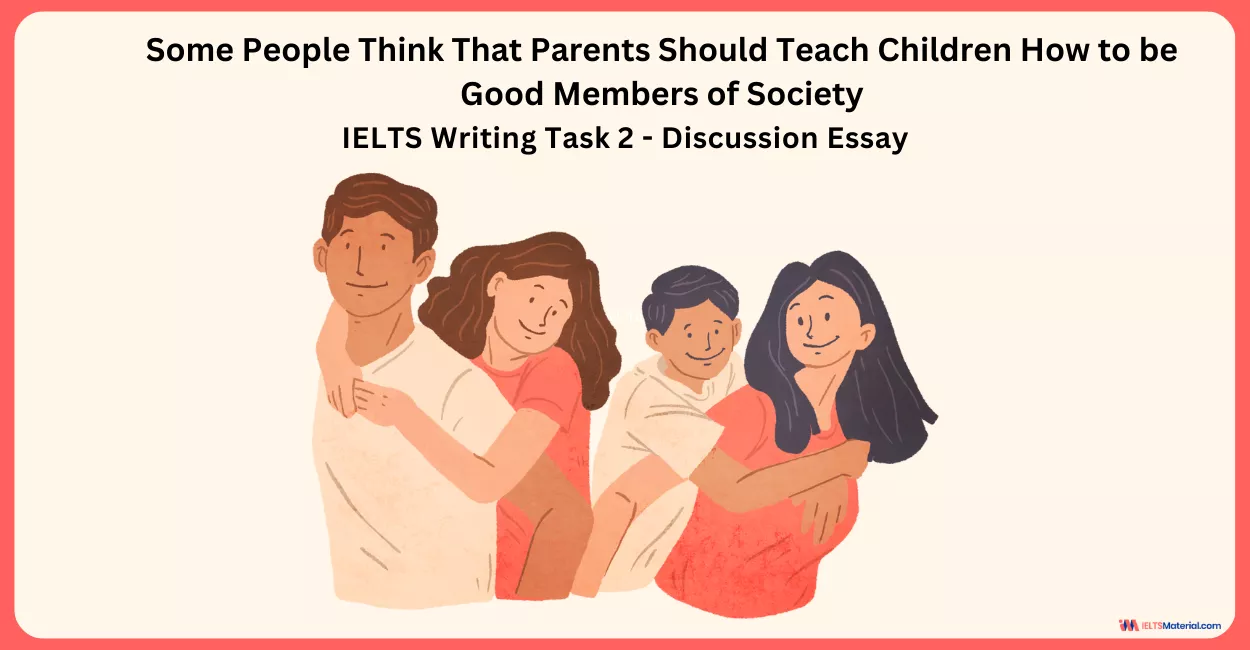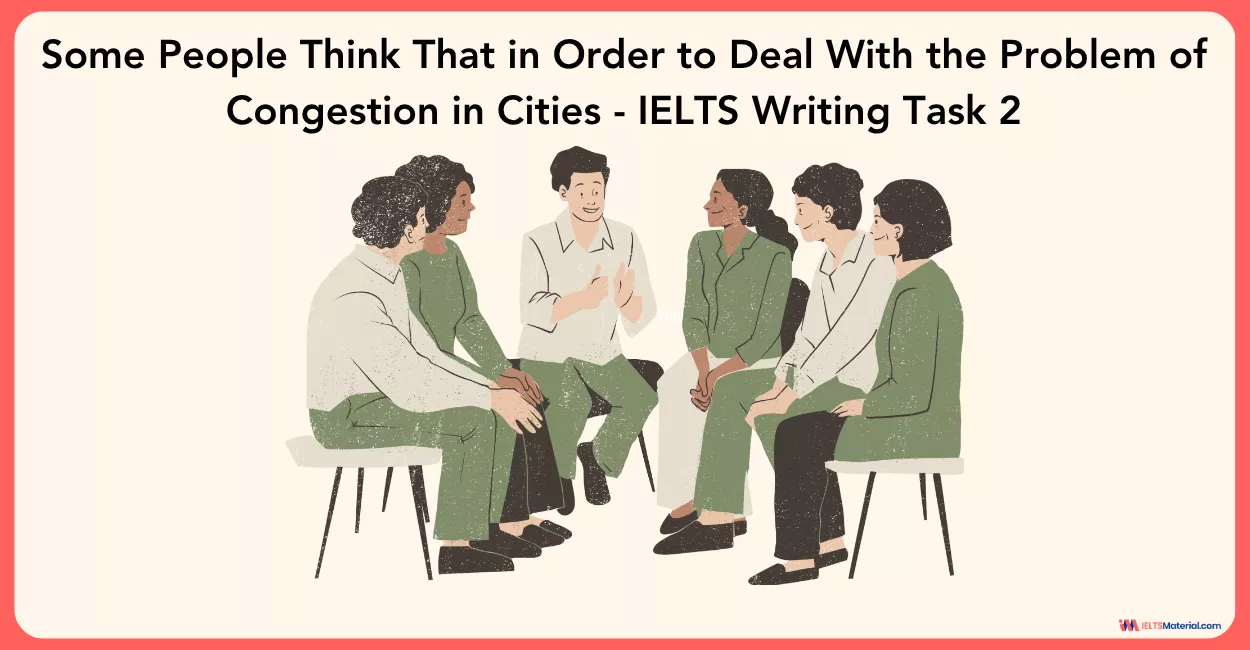Some People Think That in Order to Deal With the Problem of Congestion in Cities- IELTS Writing Task 2
7 min read
Updated On
-
Copy link
Explore 3 IELTS Writing Task 2 sample essays for the topic Some People Think That in Order to Deal With the Problem of Congestion in Cities. This blog includes high-level vocabulary, and sample answers to boost your writing score.
Table of Contents
- Question
- Outline
- Some People Think That in Order to Deal With the Problem of Congestion in Cities - Sample Answer 1
- Some People Think That in Order to Deal With the Problem of Congestion in Cities - Sample Answer 2
- Some People Think That in Order to Deal With the Problem of Congestion in Cities - Sample Answer 3
- Some People Think That in Order to Deal With the Problem of Congestion in Cities - IELTS Vocabulary

Try AI Essay Checker for Instant Band Score
The IELTS Writing Task 2 section often includes discussion essays, where you're asked to explore both sides of an argument and give your opinion. These essays test your ability to present balanced viewpoints, support them with clear reasons, and express your stance logically.
In this blog, we focus on a common discussion essay topic: “Some People Think That in Order to Deal With the Problem of Congestion in Cities, the Government Should Build More Roads. Others Think That Public Transport Should Be Improved.” You’ll find three sample answers that explore different perspectives, along with useful vocabulary to help you strengthen your IELTS Writing Task 2 and aim for a higher band score.
Question
Some people think that in order to deal with the problem of congestion in cities, privately owned vehicles should be barred in city centers while others consider this to be an unrealistic solution. Discuss both views and give your own opinion.
Outline
Essay Type
Discussion essay
Introduction
Explain in brief what you are going to write in the body of your essay.
Some argue that this has resulted in a slew of negative consequences, including traffic congestion, pollution, and safety concerns. Others argue that fully banning automobiles in major cities is a viable solution.
Body paragraphs
Paragraph 1: Traffic nowadays contributes significantly to widespread pollution. Car smoke, traffic bottlenecks, and car horns are only a few factors that have a big impact on the environment and people.
Paragraph 2: It is impossible to stop people from driving their automobiles in major cities.
Conclusion
Discuss both the sides and restate your opinion in clear and direct sentences.
Some People Think That in Order to Deal With the Problem of Congestion in Cities - Sample Answer 1
Private transportation ownership has surged globally in recent decades. Some argue that this has resulted in a slew of negative consequences, including traffic congestion, pollution, and safety concerns and fully banning automobiles in major cities is a viable solution. Others argue that it is impossible to block the movement of vehicles in the cities as they have become a part of our lives. I believe that limiting the number of cars in bigger cities could mitigate those problems. In the following paragraphs, I shall discuss both sides of the argument and elaborate on my viewpoint.
Increased salaries, economic prosperity, and a drop in vehicle prices made it more affordable for individuals to possess a car. As a result, traffic nowadays contributes significantly to widespread pollution. Car smoke, traffic bottlenecks, and car horns are only a few factors that have a big impact on the environment and people. Thus, limiting the quantity of such personal automobiles would be an effective approach. In order to address these difficulties, private automobile ownership limits should be enforced. Additionally, a recent study found that forbidding vehicles can significantly reduce health concerns, traffic accidents, and environmental damage.
However, it is impossible to stop people from driving their automobiles in major cities. A car prohibition necessitates efficient public transit, such as buses and railways. Before issuing a restriction order, the city must first prepare its infrastructure. It is understandable that individuals feel more at ease and calm while driving their automobiles. People would lose their freedom to travel freely and according to their own preferences if private automobiles were completely banned in cities. Other modes of transportation are less convenient and safer than personal transport.
To recapitulate, monitoring and restricting automobiles in major cities will undoubtedly improve people’s health while also assisting in the management of variables that contribute to the environment’s deterioration. However, outright outlawing private automobiles in major cities is not a practical solution.
Some People Think That in Order to Deal With the Problem of Congestion in Cities - Sample Answer 2
Urban traffic congestion has become a serious concern in many cities worldwide. Some believe that banning privately owned vehicles from city centers is the most effective way to resolve this issue, while others argue that such a solution is impractical. This essay will discuss both perspectives before presenting my own viewpoint.
On the one hand, supporters of banning private cars in city centers argue that it can drastically reduce traffic congestion. With fewer vehicles on the road, traffic flow becomes smoother, and public spaces become safer and more accessible. Cities like Oslo and Madrid have already implemented partial vehicle bans with noticeable improvements in air quality and pedestrian movement. Furthermore, limiting private cars can encourage people to rely more on public transport or eco-friendly alternatives like cycling and walking.
On the other hand, critics consider this approach unrealistic, particularly in cities with underdeveloped public transport systems. Many people depend on their personal vehicles for commuting due to the lack of reliable alternatives. A sudden ban could cause inconvenience, especially for those who live in suburban areas or have disabilities. Additionally, private vehicle restrictions may negatively affect local businesses in city centers that rely on customer accessibility.
In my opinion, while banning private vehicles can be effective in reducing congestion, it should not be implemented without strong supporting infrastructure. Governments must first invest in efficient, affordable, and accessible public transport options. Once viable alternatives are available, gradual restrictions on private vehicles can be introduced.
In conclusion, both perspectives offer valid arguments. However, a balanced approach involving infrastructure improvement followed by partial restrictions on private cars may offer a more practical and sustainable solution to urban congestion.
Join us in our IELTS webinars to learn proven tricks to handle IELTS Writing Task 2 essays! Explore Now!
Some People Think That in Order to Deal With the Problem of Congestion in Cities - Sample Answer 3
Traffic congestion in urban centers is a persistent issue affecting cities worldwide. While some advocate for banning privately owned vehicles from city centers to mitigate congestion, others view this approach as unrealistic. This essay will examine both arguments and provide my own perspective.
Proponents of banning private vehicles argue that it is the most direct way to alleviate congestion in densely populated urban areas. By removing a major source of traffic, cities can reduce travel time, lower carbon emissions, and create more pedestrian-friendly environments. Successful models can be seen in cities like Oslo and Madrid, where car-free zones have led to cleaner air, improved public spaces, and a surge in public transport usage. Furthermore, reducing car dependency encourages more sustainable urban development.
Conversely, opponents believe that such a ban is impractical and could lead to unintended consequences. In many cities, public transportation is still inadequate, making private vehicles essential for daily commuting. A sudden ban could disproportionately affect those who lack alternative options, including elderly individuals, people with disabilities, and workers with non-standard hours. Moreover, businesses in city centers might face a decline in foot traffic, negatively impacting local economies. Rather than outright bans, critics suggest improving public transport infrastructure and implementing congestion pricing as more effective solutions.
From my perspective, while the intention behind banning private vehicles is valid, a blanket ban may not be viable for all cities. A phased, adaptive approach—such as introducing congestion charges, carpool lanes, or restricting access during peak times—combined with significant investment in public transportation would be a more balanced and effective strategy.
In conclusion, banning privately owned vehicles in city centers may help address congestion, but its success depends on the availability of practical alternatives. A nuanced, context-specific approach is necessary to ensure both efficiency and fairness in urban transportation planning.
Practice & Prepare with IELTS Writing Task 2 Sample Questions and Answers
Some People Think That in Order to Deal With the Problem of Congestion in Cities - IELTS Vocabulary
Have a look at the IELTS Vocabulary for sample answers on 'Some People Think That in Order to Deal With the Problem of Congestion in Cities'. Now check out some relevant vocabulary used in the IELTS Writing Task 2 sample essay.
- Surge
Meaning: (verb) move suddenly and powerfully forward or upward.
Eg: An unexpected surge was observed in the automobile industry.
- Slew
Meaning: (verb) turn or slide violently or uncontrollably.
Eg: The team dealt with a slew of issues in the project.
- Viable
Meaning: (adj) capable of working successfully; feasible.
Eg: Seema is a viable candidate for this job role.
- Bottleneck
Meaning: (noun) a narrow section of road or a junction that impedes traffic flow.
Eg: The proposed subway is envisaged to clear the traffic bottleneck at this busy junction.
- Efficient
Meaning: (adjective) achieving maximum productivity with minimum wasted effort or expense.
Eg: We must make the most efficient use of the available financial resources.
- Enforced
Meaning: (adj) caused by necessity or force; compulsory.
Eg: Parking restrictions will be strictly enforced from today onwards.
- Prohibition
Meaning: (noun) the action of forbidding something, especially by law.
Eg: A prohibition was put into place that banned wearing hats in school.
- Ease
Meaning: (verb) make (something unpleasant or intense) less serious or severe.
Eg: Take medicines to ease your pain.
- Monitoring
Meaning: (verb) observe and check the progress or quality of (something) over a period of time; keep under systematic review.
Eg: The assistant was monitoring the calls.
- Outlawing
Meaning: (verb) ban or make illegal.
Eg: Outlawing Coke cans and tampon applicators is the next step in protecting America’s youth from the scourge of pot.
This blog includes 3 Band 8 & 9 sample answers for the discussion essay topic "Some People Think That in Order to Deal With the Problem of Congestion in Cities..." along with useful topic-specific vocabulary. Practising with these samples can help you enhance your structure, coherence, and lexical range — essential for boosting your IELTS Writing Task 2 band score.
Now that you have explored sample answers on this topic, it’s time to write your own! Leave your response in the comments or try our FREE evaluation service. For more practice, check out our IELTS Writing practice tests!
Also Check:
Practice IELTS Writing Task 2 based on Essay types

Start Preparing for IELTS: Get Your 10-Day Study Plan Today!
Recent Articles

Haniya Yashfeen


Prity Mallick

Kasturika Samanta




Post your Comments